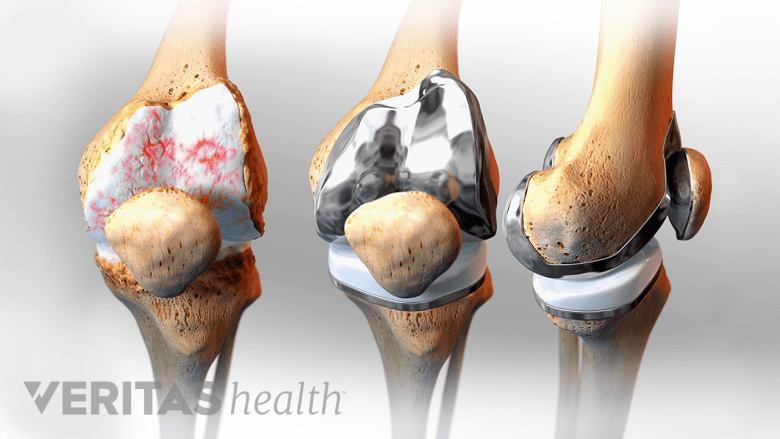If you have moderate to severe knee arthritis and nonsurgical treatments haven’t provided enough relief, it may be time to consider knee surgery.

Total knee replacement and other surgical options can be very helpful for some people with knee arthritis. Read Undergoing Total Knee Replacement for Knee Arthritis
Deciding whether or not to have knee surgery can be stressful. Knowing the right questions to ask your doctor can make the choice easier.
1. What type of knee surgery is right for me?
The type of surgery your surgeon recommends will depend on many factors, including the extent of arthritic damage to your knee, your age, and your general physical condition, as well as the surgeon’s expertise.
Potential surgical options may include:
- Total knee replacement
- Partial knee replacement (unicompartmental knee arthroplasty)
- Knee osteotomy surgery
- Knee arthroscopy
- Cartilage repair and restoration
See Types of Knee Surgery for Arthritis Treatment
Total knee replacement is the most commonly recommended choice and the surgery with the highest success rate.
2. What is the typical outcome for someone like me?
It’s important that you have accurate expectations about what knee surgery can accomplish. Is it likely that all your pain will go away? Will you regain full function or partial function of your knee? Might you be able to return to certain activities and sports?
3. What are the possible complications? How likely are they for someone like me?
Most complication rates for knee surgery are low, but complications can occur. These can include blood clots, infection, or damage to the knee or surrounding tissue.
Ask for or find out the complication rates for your surgeon and for the health care facility where the surgery will be performed. As a general rule, the more experience your surgeon has with that particular procedure, the better the odds for a good outcome. Also, keep in mind that health care facilities that do high volume joint replacement procedures tend to have better outcomes.
See Total Knee Replacement Risks and Complications
4. Can I do anything to increase the odds of a successful surgery?
There may be things you can do before surgery to increase the chances of a good outcome. For example, a surgeon may ask you to do exercises to strengthen the muscles that support and surround the knee, lose excess weight, and/or quit smoking.
See How Smoking, Age, and Other Factors May Affect Knee Replacement Surgery
5. How much pain will I feel after surgery? What can be done to relieve it?
Knowing how much pain is considered normal can help ease your anxiety during the first few days after surgery, when pain levels are likely to peak. Your surgical team will tell you what medications to take to control pain and swelling. Which medications are recommended and how long you need to take them will depend on your surgery and your unique health circumstances.
See What to Expect After Knee Replacement
6. How long will recovery take?
Recovery timelines vary significantly. For example, a person who has arthroscopic knee surgery may be fully healed at 6 to 8 weeks. A person who has total knee replacement can expect to be back to their daily routine at 6 to 8 weeks, but a full recovery will likely take longer.
When learning about your recovery, find out if you’ll need an assistive walking device after surgery, such as a walker or crutches, and for how long. Also ask if you’ll need assistance at home from a spouse, family member, friend, or personal aide.
See Total Knee Replacement Surgery Recovery
7. How much physical therapy do I have to do after surgery?
Participating in physical therapy takes time and effort—it can feel like a part-time job. It is also essential for most knee surgery recoveries. Find out how much time you will be expected to devote to physical therapy exercises, both with a physical therapist and at home on your own.
8. What will happen if I put off surgery for another 6 to 12 months?
After talking with your surgeon about your options, you may think it’s preferable or convenient to postpone surgery. Putting off surgery for several months, a year, or even longer is OK for some people. For others, postponing surgery may have negative consequences—as arthritic joint damage becomes more severe, the likelihood of a successful surgery may go down.
See Scheduling vs. Postponing Knee Replacement Surgery
Talk to your surgeon about these and other questions you may have. During the appointment, take notes or have a friend or family member take notes. You can review the notes later as you weigh the pros and cons.
Learn more:
Types of Knee Surgery for Arthritis Treatment
Total Knee Replacement: Facts and Considerations for Patients

